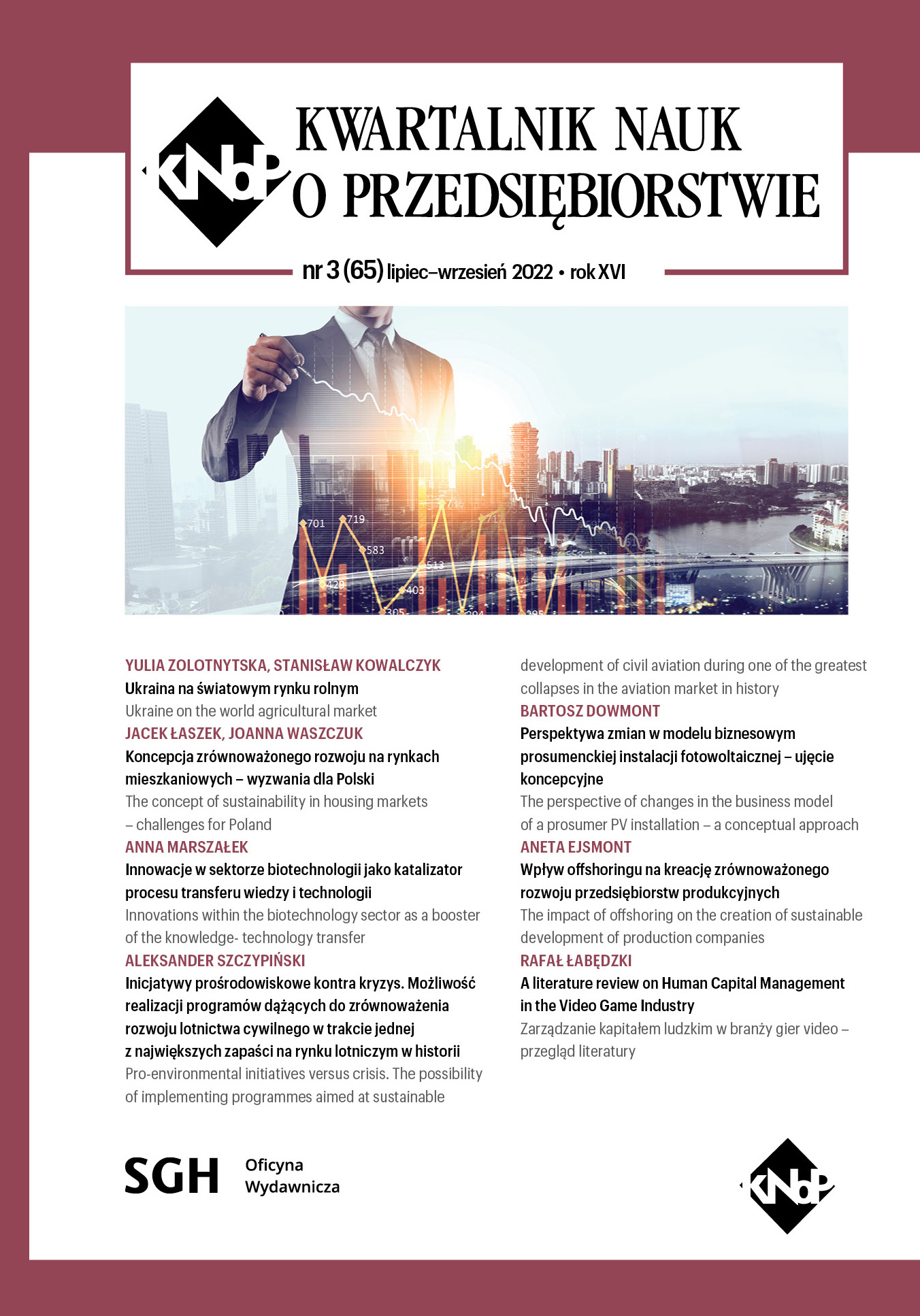Pro-environmental initiatives versus crisis. The possibility of implementing programmes aimed at sustainable development of civil aviation during one of the greatest collapses in the aviation market in history
Main Article Content
Abstract
Pro-environmental initiatives are constantly gaining momentum and have a significant impact on the entities acting on the markets regulated by them. Air transport is particularly exposed to the risk of large consequences due to relatively high level of carbon dioxide emission compared to other forms of transportation. On the aviation market, the main emitters of CO2 are air carriers, which are also the central group on this market in terms of cashflows. The aim of the study was to review selected pro-environmental initiatives affecting the operational activities of aviation companies and to check the direction of its changes made by decision-makers in response to COVID-19 pandemic crisis. Author has hypothesized that air market companies are not able to cover the costs stemming from the implemented pro-envitonmental initiatives, which was confirmed by analyzing and comparing the market overview and financial situation of the largest air carriers in Europe at the end of 2019 and 2020.
Downloads
Article Details
The author of the article declares that the submitted article does not infringe the copyrights of third parties. The author agrees to subject the article to the review procedure and to make editorial changes. The author transfers, free of charge, to SGH Publishing House the author's economic rights to the work in the fields of exploitation listed in the Article 50 of the Act of 4 February 1994 on Copyright and Related Rights – provided that the work has been accepted for publication and published.
SGH Publishing House holds economic copyrights to all content of the journal. Placing the text of the article in a repository, on the author's home page or on any other page is allowed as long as it does not involve obtaining economic benefits, and the text will be provided with source information (including the title, year, number and internet address of the journal).
References
Air Transport Action Group (2020), Facts & Figures, https://www.atag.org/facts-figures.html (dostęp: 29.06.2021).
Atlantic Council (2020), Sustainable Aviation Fuel Policy in the United States: A Pragmatic Way Forward, https://www.atlanticcouncil.org/wp-content/uploads/2020/04/AC_SAF_0420_v8.pdf (dostęp: 29.06.2021).
Deutsche Lufthansa AG (2020), Lufthansa Group Financial Statement 2020, https://investor-relations.lufthansagroup.com/fileadmin/downloads/en/financial-reports/financial-statements/LH-FS-2020‑e.pdf (dostęp: 29.06.2021).
EUR-Lex (2021a), Decyzja Rady w sprawie stanowiska, jakie ma być zajęte w imieniu Unii Europejskiej w ramach Organizacji Międzynarodowego Lotnictwa Cywilnego w odniesieniu do powiadomienia o dobrowolnym udziale w mechanizmie kompensacji i redukcji CO2 dla lotnictwa międzynarodowego (CORSIA) od dnia 1 stycznia 2021 r. oraz o wariancie wybranym do obliczania wymagań wobec przewoźników lotniczych w zakresie kompensacji w latach 2021–2023, https://eur-lex.europa.eu/legal-content/PL/TXT/?uri=CELEX%3A52020PC0194 (dostęp: 29.06.2021).
EUR-Lex (2021b), Decyzja wykonawcza Komisji (UE) 2019/903 z dnia 29 maja 2019 r. ustanawiająca ogólnounijne docelowe parametry skuteczności działania sieci zarządzania ruchem lotniczym na trzeci okres odniesienia rozpoczynający się w dniu 1 stycznia 2020 r. i kończący się w dniu 31 grudnia 2024 r., https://eur-lex.europa.eu/legal-content/PL/TXT/PDF/?uri=CELEX:32019D0903&from=EN (dostęp: 29.06.2021).
European Organisation for the Safety of Air Navigation (2021), EUROCONTROL Five-Year
Forecast Update 2021–2024, https://www.eurocontrol.int/publication/eurocontrol-forecastupdate-2021–2024 (dostęp: 29.06.2021).
European Commission (2021), Reducing emissions from aviation, https://ec.europa.eu/clima/policies/transport/aviation_en (dostęp: 29.06.2021).
International Air Transport Association (2021), Aviation Carbon Exchange, https://www.iata.org/en/programs/environment/ace (dostęp: 29.06.2021).
International Air Transport Association (2021a), Economic Performance of the Airline Industry, https://www.iata.org/en/iata-repository/publications/economic-reports/airline-industry-economic-performance---november-2020---report/ (dostęp: 29.06.2021).
International Air Transport Association (2021b), IATA Annual Review 2020, https://www.iata.org/contentassets/c81222d96c9a4e0bb4ff6ced0126f0bb/iata-annual-review-2020.pdf (dostęp:29.06.2021).
International Airlines Group, International Airlines Group Annual Report and Accounts 2020, https://www.iairgroup.com/~/media/Files/I/IAG/annual-reports/iag-annual-reports/en/iagannual-report-and-accounts-2020.pdf (dostęp: 29.06.2021).
International Civil Aviation Organization (2021a), What is CORSIA and how does it work?, https://www.icao.int/environmental-protection/pages/a39_corsia_faq2.aspx (dostęp: 29.06.2021).
International Civil Aviation Organization (2021b), Sustainable Aviation Fuels (SAF), https://www.icao.int/environmental-protection/pages/SAF.aspx (dostęp: 29.06.2021).
International Civil Aviation Organization (2021c), ICAO Council agrees to safeguard adjustment for CORSIA in light of COVID-19 pandemic, https://www.icao.int/Newsroom/Pages/ICAOCouncil-agrees-to-the-safeguard-adjustment-for-CORSIA-in-light-of-COVID19‑pandemic.aspx (dostęp: 29.06.2021).
Performance Review Body of the Single European Sky (2021), Performance Review Body: Advice on the revision of performance targets for RP3, https://webgate.ec.europa.eu/eusinglesky/node_en (dostęp: 29.06.2021).
PricewaterhouseCoopers (2021), Aviation Industry Outlook 2021, https://www.pwc.ie/reports/aviation-industry-outlook-2021.html (dostęp: 29.06.2021).
U. S. Energy Information Administration (2021, U. S. Gulf Coast Kerosene-Type Jet Fuel Spot Price FOB, https://www.eia.gov/dnav/pet/hist/EER_EPJK_PF4_RGC_DPGD.htm (dostęp: 29.06.2021).

